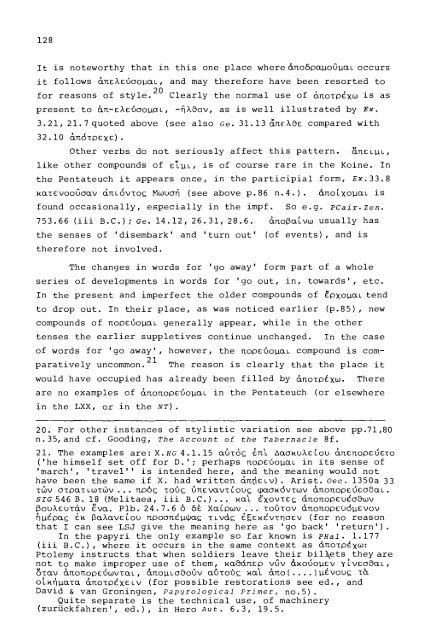A Lexical Study of the Septuagint Version of the Pentateuch
A Lexical Study of the Septuagint Version of the Pentateuch
A Lexical Study of the Septuagint Version of the Pentateuch
Create successful ePaper yourself
Turn your PDF publications into a flip-book with our unique Google optimized e-Paper software.
It is noteworthy that in this one place where άποδραμούμαι occurs<br />
it follows άπελεύσομαι., and may <strong>the</strong>refore have been resorted to<br />
20 ,<br />
for reasons <strong>of</strong> style. Clearly <strong>the</strong> normal use <strong>of</strong> σ.τιοτρεχω is as<br />
present to άπ-ελεύσομαι, -ήλθον, as is well illustrated by Ex.<br />
3.21, 21.7 quoted above (see also Ge. 31.13 άπελθε compared with<br />
32.10 άπότρεχε) .<br />
O<strong>the</strong>r verbs do not seriously affect this pattern. απειμι,<br />
like o<strong>the</strong>r compounds <strong>of</strong> ειμι, is <strong>of</strong> course rare in <strong>the</strong> Koine. In<br />
<strong>the</strong> <strong>Pentateuch</strong> it appears once, in <strong>the</strong> participial form, Ex.33.8<br />
κατενοούσαν άπιόντος Μωυσή (see above p.86 n.4.). άποιχομαι is<br />
found occasionally, especially in <strong>the</strong> impf. So e.g. PCair.zen.<br />
753.66 (iii B.C.); Ge. 14.12, 26.31, 28.6. αποβαίνω usually has<br />
<strong>the</strong> senses <strong>of</strong> 'disembark' and 'turn out' (<strong>of</strong> events), and is<br />
<strong>the</strong>refore not involved.<br />
The changes in words for 'go away' form part <strong>of</strong> a whole<br />
series <strong>of</strong> developments in words for 'go out, in, towards', etc.<br />
In <strong>the</strong> present and imperfect <strong>the</strong> older compounds <strong>of</strong> έρχομαι tend<br />
to drop out. In <strong>the</strong>ir place, as was noticed earlier (p.85), new<br />
compounds <strong>of</strong> πορεύομαι generally appear, while in <strong>the</strong> o<strong>the</strong>r<br />
tenses <strong>the</strong> earlier suppletives continue unchanged. In <strong>the</strong> case<br />
<strong>of</strong> words for 'go away', however, <strong>the</strong> πορεύομαι compound is com-<br />
21<br />
paratively uncommon. The reason is clearly that <strong>the</strong> place it<br />
would have occupied has already been filled by άποτρέχω. There<br />
are no examples <strong>of</strong> άποπορεύομαι in <strong>the</strong> <strong>Pentateuch</strong> (cr elsewhere<br />
in <strong>the</strong> LXX, or in <strong>the</strong> NT).<br />
20. For o<strong>the</strong>r instances <strong>of</strong> stylistic variation see above pp.71,80<br />
n.35, and cf. Gooding, The Account <strong>of</strong> <strong>the</strong> Tabernacle 8f.<br />
21. The examples are: X.HG 4.1.15 αυτός έπί Δασκυλείου άπεπορεύετο<br />
('he himself set <strong>of</strong>f for D.'; perhaps πορεύομαι in its sense <strong>of</strong><br />
'march', 'travel 1<br />
' is intended here, and <strong>the</strong> meaning would not<br />
have been <strong>the</strong> same if X. had written άπήειν). Arist. Oec. 1350a 33<br />
τών στρατιωτών... πρός τούς ύπεναντίους φασκόντων άποπορεύεσθαι.<br />
s IG 546 Β. 18 (Melitaea, iii B.C.)... και έχοντες άποπορευέσθων<br />
βουλευτάν έ'να. Plb. 24.7.6 ό δέ Χαίρων ... τούτον άποπορευόμενον<br />
ημέρας έκ βάλανε ίου προσπέμψας τινάς έξεκέντησεν (for no reason<br />
that I can see LSJ give <strong>the</strong> meaning here as 'go back' 'return').<br />
In <strong>the</strong> papyri <strong>the</strong> only example so far known is PHal. 1.177<br />
(iii B.C.), where it occurs in <strong>the</strong> same context as άποτρέχω:<br />
Ptolemy instructs that when soldiers leave <strong>the</strong>ir billets <strong>the</strong>y are<br />
not to make improper use <strong>of</strong> <strong>the</strong>m, καθάπερ νύν άκούομεν γίνεσθαι,<br />
δταν άποπορεύωνται, άπομισθούν αυτούς και άπο[....]μένους τά<br />
οικήματα άποτρέχειν (for possible restorations see ed., and<br />
David & van Groningen, Papyrological Primer, no.5).<br />
Quite separate is <strong>the</strong> technical use, <strong>of</strong> machinery<br />
(zurückfahren 1<br />
, ed.), in Hero Aut. 6.3, 19.5.

















